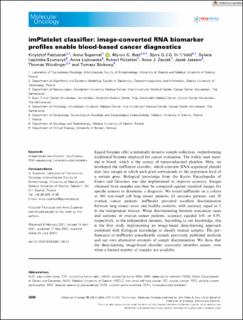| dc.contributor.author | Pastuszak, Krzysztof | |
| dc.contributor.author | Supernat, Anna | |
| dc.contributor.author | Best, Myron G. | |
| dc.contributor.author | In 't Veld, Sjors G.J.G. | |
| dc.contributor.author | Łapińska-Szumczyk, Sylwia | |
| dc.contributor.author | Łojkowska, Anna | |
| dc.contributor.author | Różański, Robert | |
| dc.contributor.author | Zaczek, Anna J | |
| dc.contributor.author | Jassem, Jacek | |
| dc.contributor.author | Würdinger, Thomas | |
| dc.contributor.author | Stokowy, Tomasz | |
| dc.date.accessioned | 2022-04-20T07:25:17Z | |
| dc.date.available | 2022-04-20T07:25:17Z | |
| dc.date.created | 2022-01-27T11:00:24Z | |
| dc.date.issued | 2021 | |
| dc.identifier.issn | 1574-7891 | |
| dc.identifier.uri | https://hdl.handle.net/11250/2991474 | |
| dc.description.abstract | Liquid biopsies offer a minimally invasive sample collection, outperforming traditional biopsies employed for cancer evaluation. The widely used material is blood, which is the source of tumor-educated platelets. Here, we developed the imPlatelet classifier, which converts RNA-sequenced platelet data into images in which each pixel corresponds to the expression level of a certain gene. Biological knowledge from the Kyoto Encyclopedia of Genes and Genomes was also implemented to improve accuracy. Images obtained from samples can then be compared against standard images for specific cancers to determine a diagnosis. We tested imPlatelet on a cohort of 401 non-small cell lung cancer patients, 62 sarcoma patients, and 28 ovarian cancer patients. imPlatelet provided excellent discrimination between lung cancer cases and healthy controls, with accuracy equal to 1 in the independent dataset. When discriminating between noncancer cases and sarcoma or ovarian cancer patients, accuracy equaled 0.91 or 0.95, respectively, in the independent datasets. According to our knowledge, this is the first study implementing an image-based deep-learning approach combined with biological knowledge to classify human samples. The performance of imPlatelet considerably exceeds previously published methods and our own alternative attempts of sample discrimination. We show that the deep-learning image-based classifier accurately identifies cancer, even when a limited number of samples are available. | en_US |
| dc.language.iso | eng | en_US |
| dc.publisher | Wiley | en_US |
| dc.rights | Navngivelse 4.0 Internasjonal | * |
| dc.rights.uri | http://creativecommons.org/licenses/by/4.0/deed.no | * |
| dc.title | imPlatelet classifier: image-converted RNA biomarker profiles enable blood-based cancer diagnostics | en_US |
| dc.type | Journal article | en_US |
| dc.type | Peer reviewed | en_US |
| dc.description.version | publishedVersion | en_US |
| dc.rights.holder | Copyright 2021 The Author(s) | en_US |
| cristin.ispublished | true | |
| cristin.fulltext | original | |
| cristin.qualitycode | 1 | |
| dc.identifier.doi | 10.1002/1878-0261.13014 | |
| dc.identifier.cristin | 1991097 | |
| dc.source.journal | Molecular Oncology | en_US |
| dc.source.pagenumber | 2688-2701 | en_US |
| dc.identifier.citation | Molecular Oncology. 2021, 15 (10), 2688-2701. | en_US |
| dc.source.volume | 15 | en_US |
| dc.source.issue | 10 | en_US |

